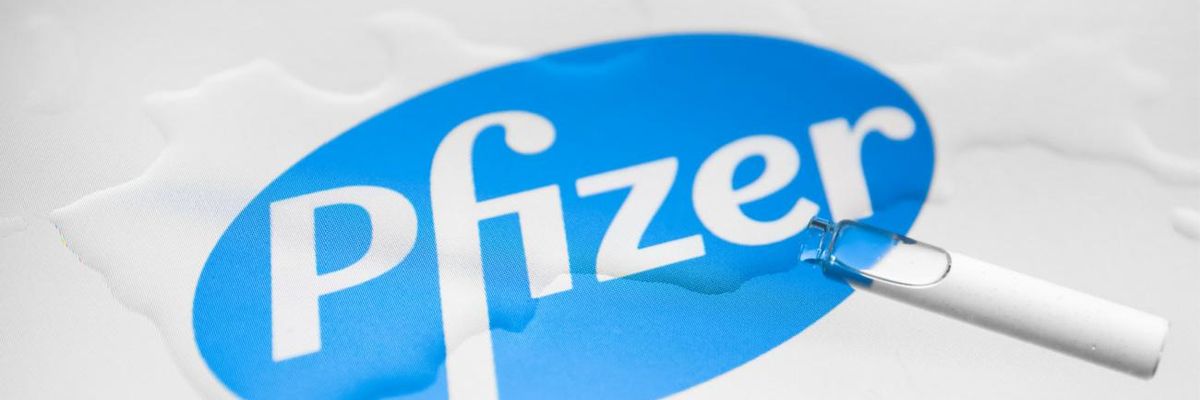As calls mount from public health experts and advocates for a "People's Vaccine" in order to combat the continued spread of the coronavirus, particularly in developing nations, Pfizer on Tuesday announced that it enjoyed record profits in the first quarter of 2021, owing largely to the vaccine it manufactured with German company BioNTech--the vast majority of which has been sold to wealthy countries.
The company reported $3.5 billion in revenue from the vaccine in the first three months of this year, and estimated that profits from the vaccine account for 20% of its revenue--suggesting pretax vaccine profits of $900 million. By the end of this year, Pfizer expects the vaccine to garner $26 billion in total revenue, the company said.
"Despite all the talk about COVAX, [Pfizer has] been far more interested in bilateral deals, because that's where they make their money."
--Richard Kozul-Wright, United Nations Conference on Trade and Development
Out of the 2.5 billion vaccine doses that Pfizer plans to produce this year, the company has pledged to send up to 40 million doses--less than 2% of its inventory--to COVAX, the global facility that supplies vaccines to poor countries. As Common Dreams reported Monday, the pharmaceutical company Moderna plans to send just 34 million doses to COVAX in the fourth quarter of this year, a fraction of the 800 million to one billion doses it expects to produce by the end of the year.
While the pandemic has proved profitable for Pfizer, recent reporting has shown that industry lobbyists have been working hard to push U.S. lawmakers away from supporting the patent waiver push at the World Trade Organization (WTO).
Although Pfizer announced its plan to send doses to COVAX with great fanfare, claiming in January it hopes to ensure "developing countries have the same access as the rest of the world," the doses both companies plan to send to the facility amount to "a drop in the ocean," Clare Wenham, a health policy expert at the London School of Economics, told the New York Times Tuesday.
On Twitter, antitrust expert Hal Singer noted that providing just a fraction of the vaccine doses available to poor countries goes against the advice of the World Health Organization (WHO), which has warned that "solidarity is the only way out" of the global public health emergency.
Pfizer has not disclosed the prices it's charging for its vaccine, but as the Times reported, "the fact that Pfizer appears to have earned something like $900 million in pretax profits from its vaccine--coupled with its comparatively small sales to poor countries--suggests that profits have trumped other considerations."
"Despite all the talk about COVAX, they have been far more interested in bilateral deals, because that's where they make their money," Richard Kozul-Wright of the United Nations Conference on Trade and Development told the Times.
Pfizer announced its quarterly profits amid mounting concerns about uncontrolled Covid-19 outbreaks in India, Laos, Nepal, and other developing countries, and intensifying calls for the WTO to lift patent protections for the vaccines to allow developing countries to produce their own generic versions.
India reported Tuesday it had passed 20 million coronavirus infections, with cases skyrocketing by more than two million in the past week--an outbreak that's exacerbated by shortages of hospital beds, medical supplies, and vaccine doses.
As Common Dreams reported Tuesday, nations throughout Southeast Asia and bordering India have begun reporting surges in Covid-19 cases--suggesting that providing the Global South with vaccine doses--and the willingness of companies like Pfizer to put aside their profit motives--is a matter of public health for the rest of the world.
Advocates including Lara Dovifat, a campaign adviser for MSF Access Campaign, part of the humanitarian group Doctors Without Borders, noted that while Pfizer is reporting major profits for its shareholders, company developed its vaccine with public funds.
"Pfizer frequently points out that it opted not to take federal funds proffered by the Trump administration under Operation Warp Speed, the initiative that promoted the rapid development of Covid-19 vaccines," reported the Times. "But BioNTech received substantial support from the German government in developing their joint vaccine. And taxpayer-funded research aided both companies: The National Institutes of Health patented technology that helped make so-called messenger RNA vaccines possible. BioNTech has a licensing agreement with the N.I.H., and Pfizer is piggybacking on that license."
By refusing to support a suspension of patents in the midst of a global crisis, the Debt Collective said on social media, Pfizer indicates it is "willing to kill millions to protect the patents that make them billions."




